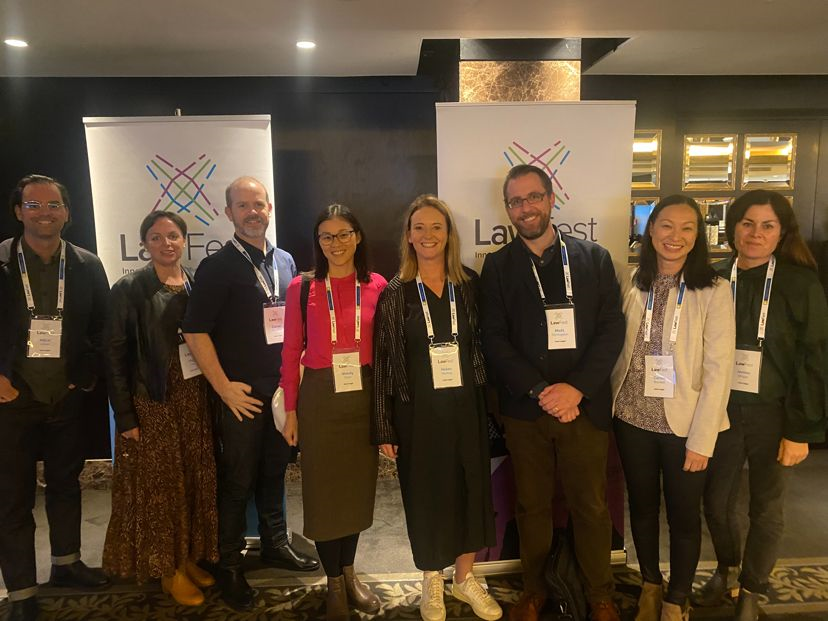Pictured L-R: Juno team members: Mitch Julian, Vicky Lee, Daniel Gilchrist, Wendy Chen, Helen Mackay, Matt Farrington, Carina Barnett, and Jenine Briggs.
Nick Abrahams' opening session generated significant interest, particularly his insights on the impact of AI and legal tech. Despite predictions of the decline of the legal profession, such as in Susskind's book "The End of Lawyers", Abrahams highlighted its thriving nature, citing the increase in in-house jobs and stable law firm revenues. Legal tech, far from replacing lawyers, has proven to be a valuable tool that enhances their work. Abrahams also stressed the importance of embracing large language models (LLMs) like Chat GPT, as they are poised to become indispensable for lawyers in the future. As he said, "Did calculators make us dumb? No, they just levelled up our knowledge.”
The session shed light on estimates such as those by Goldman Sachs (March 2023) that AI can automate 44% of legal tasks, suggesting a simplistic approach to what we do – spoiler; it's not just templates. Abrahams cautioned attendees to exercise caution when using Chat GPT and similar technologies, as AI can be an incredible liar and, and he says, at least we could tell when Pinocchio was making stuff up. This highlights the importance of critical interpretation and verification of information. He emphasized that “AI will not replace you - a person using AI will”. Therefore, we can think of Generative AI (such as Chat GPT) as a "very smart friend with excellent manners".
Callum McKirdy explored the concept of neurodiversity and emphasised the importance of designing systems and processes that cater to a diverse range of individuals. McKirdy highlighted the need to move beyond the confines of the bell curve and create environments that work for everyone. Our Juno Lawyers commented afterwards that it is refreshing to have the value of neurodiversity being recognised at a professional level.
In the in-house focus stream, it was evident from audience feedback and insights from panelists that dedicated legal ops specialists within in-house teams are on the rise. This observation sparked curiosity among attendees about the career path leading to this specialisation, indicating a growing recognition of the value that legal ops brings to optimising legal processes.
Verity White's session on rebellion and innovation resonated with attendees as she shared inspiring examples of individuals who challenge conventional practices and achieve positive change. This serves as a reminder that there are various ways to disrupt and reshape the legal landscape, as "To create an incredible future, we need results driven rebels".
She quoted SJ Price, emphasizing the transformative potential of AI in the legal field. The quote stated, "AI heralds a disruption in law beyond our wildest dreams. Harness its potential, exploit its capabilities, and be ready for transformative iterations of what it means to be a lawyer." This sentiment echoed throughout the event, highlighting the need for legal professionals to adapt to the evolving landscape.
Matt Farrington's insights on Chat GPT drew attention to the stochastic nature of the system (i.e. having a random probability distribution) and that sometimes it will just be wrong. While there have been significant improvements between Chat GPT versions in such short timeframes (e.g. Chat GPT-3 sat the bar exam and was in the bottom 10th percentile while Chat GPT-4 was in the 90th percentile), and it can provide outcomes, it often fails to explain its reasoning. This can pose challenges, especially in cases such as insurance claim rejections. Farrington recommended the implementation of a legally binding "kill switch" as a risk mitigation measure. These discussions reminded attendees of the importance of responsible and ethical AI usage, the need to address the limitations of AI systems and, ultimately, that you cannot contract out of AI risks, particularly reputational ones.
Prompt engineering tips:
- Give as much detail and reference points
- Define AI’s role ("you are making a submission to the government”)
- What voice (strong, compelling, Seinfeld etc)
- Define recipients and channel
- Give a sample answer
- Chaining (where inference rules are applied to existing data to extract additional data until an end goal is achieved)
While LawFest is a conference focused on legal innovation and technology, it also highlighted the importance of keeping the human element at the forefront. Efficiency, effectiveness, and enjoyment were identified as key factors in adopting technology solutions, and a design sprint showcased the significance of human-centred approaches in future technology ideas. Nick Abrahams commented that legal work can be scary for some people and that a lawyer provides a human comfort beyond just a contract or tool. He shared that when he added a human element to his tech product offering, uptake substantially improved.
LawFest underscored the importance of embracing change, staying informed about technological advancements, and reimagining traditional practices to shape the future of the legal profession. Congratulations to Andrew King and the LawFest speakers and sponsors for a wonderful learning event. As our final speaker Melissa Lyon said, it was all about “better experiences in the law for the people we work with and for”.
